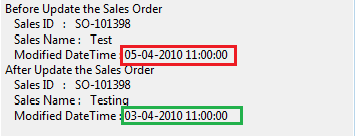Date Time Difference :
Class : TestDateTimeDifference
Class Declaration :
class TestDateTimeDifference
{
int
n,x,y,z,frommonth,tomonth,diffmonth,fromyear,toyear,remains;
date d;
System.DateTime temp,tempTo,tempFrom;
System.TimeSpan totalDiff,fromDiff,toDiff,val;
}
Method : TimeDifferenceFind
Public void
timeDifferenceFind(utcDateTime
_startDate,utcDateTime _endDate)
{
tempFrom = _startDate;
tempTo = _endDate;
TotalDiff = tempTo.Subtract(tempFrom);
info("Total Difference
: ");
info(TotalDiff.ToString());
fromyear = DateTimeUtil::year(_startDate);
toyear =
DateTimeUtil::year(_endDate);
frommonth = DateTimeUtil::month(_startDate);
tomonth =
DateTimeUtil::month(_endDate);
z= (toyear - fromyear);
for(y=0;y<=z;y++)
{
if(z==0) //To Find the Time Difference in same Year
x = 0;
if(z==1 && y==0) //To find
the Time Differnce for two differnt continuous years
x=1;
else if(z==1
&& y==1)
x=3;
if(z>1 && y==0) // To
find the Difference in two different years
x = 1;
else if(z>1
&& y<z)
x = 2;
else if(z>1
&& y==z)
x = 3;
switch(x)
{
case 0 :
info(strFmt("In %1 : ",fromyear));
this.startMonthDiff(_startDate);
n = frommonth + 1;
remains = tomonth - 1;
this.otherMonthsDiff(remains,n,fromyear);
this.endMonthDiff(_endDate);
break;
case 1 :
frommonth = DateTimeUtil::month(_startDate);
tomonth = 12;
info(strFmt("In %1 : ",fromyear));
this.startMonthDiff(_startDate);
n = frommonth + 1;
remains = tomonth;
this.otherMonthsDiff(remains,n,fromyear);
break;
case 2:
frommonth = 0;
tomonth = 12;
fromyear = fromyear+1;
info(strFmt("In %1 : ",fromyear));
n = frommonth + 1;
remains = tomonth;
this.otherMonthsDiff(remains,n,fromyear);
break;
case 3 :
frommonth = 1;
tomonth =
DateTimeUtil::month(_endDate);
info(strFmt("In %1 : ",toyear));
n = frommonth;
remains = tomonth-1;
this.otherMonthsDiff(remains,n,toyear);
this.endMonthDiff(_endDate);
break;
}
}
}
Method : OtherMonthsDiff
Public void
otherMonthsDiff(int _remain,int _start,int
_dateYear)
{
while(_start<=_remain)
{
d = mkDate(1,_start,_dateYear);
d = endmth(d);
val = new
System.TimeSpan(dayOfMth(d),0,0,0,0);
info(strFmt("The Time difference in %1 is : ",mthName(_start)));
info(val.ToString());
_start++;
}
}
Method : StartMonthDiff
Public System.TimeSpan startMonthDiff(utcDateTime
_datefrom)
{
d = endmth(DateTimeUtil::date(_datefrom));
temp = mkDate(dayOfMth(d),frommonth,fromyear);
fromdiff = temp.Subtract(_datefrom);
info(strFmt("The Time difference in %1 is : ",mthName(frommonth)));
info(fromdiff.ToString());
return
fromDiff;
}
Method : EndMonthDiff
Public System.TimeSpan endMonthDiff(utcDateTime
_dateTo)
{
d = dateStartMth(DateTimeUtil::date(_dateTo));
temp = mkDate(dayOfMth(d),tomonth,toyear);
toDiff = tempto.Subtract(temp);
toDiff = toDiff.Add(new
System.TimeSpan(1,0,0,0,0));
info(strFmt("The Time difference in %1 is : ",mthName(tomonth)));
info(toDiff.ToString());
return
toDiff;
}
Job :
DateTimeDifference dateTimeDifference;
dateTimeDifference = new DateTimeDifference();
dateTimeDifference.timeDifferenceFind(new System.DateTime(2012, 1, 15,23,15,0),new System.DateTime(2014, 2, 10,10,15,0));



